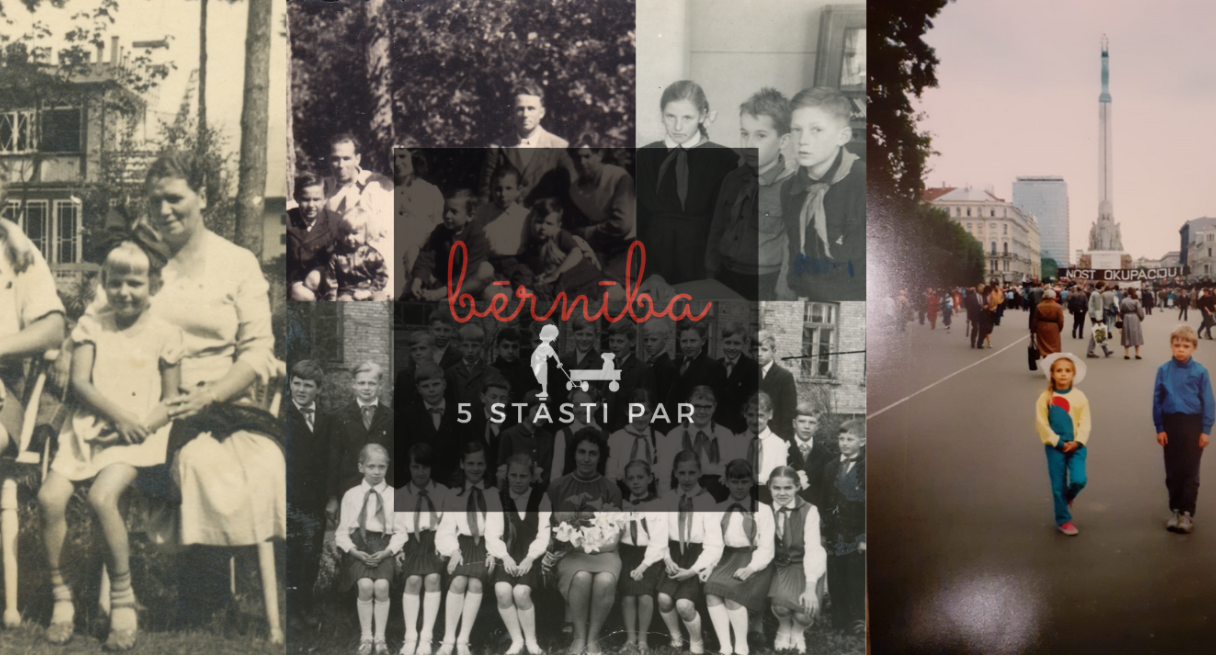Donate to Museum
Each donation helps to ensure the Museum's activities, allowing it to function and provide information for people from all over the world.
The Museum is grateful to each donor and invites everyone to contribute.
Childhood. Five Stories About - VIDEO SERIES

Using the testimonies from the Audio-Visual Archive of the Museum of the Occupation of Latvia, we have created a series of videos “Childhood. Five Stories About”. These fragments have been compiled into 5 stories, that reveal life in different periods of Latvia’s 20th century history from a child’s perspective. Family, games, school, and language are a few of the aspects through which life “through a child’s eyes” is revealed.
In this video all five stories are combined in one, separate videos are available below.
1st story. Independent Latvia
The heroes of this story are sharing their memories about their happy childhood in pre-war Latvia. Olita Medne (b.1932), Inta Krūmiņa (1993-2009), Alfrēds Puškevičs (1931-2015) un Irēna Valija Ābele (b.1926) were deported on 14 June 1941. Lorija Šneidere (1924-2009) for anti-soviet activity was arrested in 1947, but Skaidrīte Meldriņa (1923-2008) ended up in a filtration camp in Siberia in 1945. Only Maiga Fridvalde (b.1926) wasn’t repressed by the Soviet regime.
2nd story. Second World War
The heroes of the second story have spent their childhood during the Second World War. Elma Miniate (1925-2011) saw the Red army coming into Latvia in the summer of 1940, Lonija Šneidere (1924 -2009) and Aina Lesiņa (1934-2008) lived through the scare of attacks and bombardment by the German forces, Valentīns Kalniņš (b.1933) lived next to the Biķernieku forest, where mass killings of Jews were organized at the end of 1941, Inta Krūmiņa (1933-2009) wasn’t allowed to go to school in Siberia, Sylvia Gunther (b.1940) went to Germany at the start of the war and never again returned back to Latvia, Lidija Bormane (1931-2012) experienced Red army soldier cruelty towards her mother.
3rd story. Post - war period
The period after the Second World war and the return of Soviet occupation was not easy for children. The war left consequences – Juris Jenerts (b.1945) was playing with ammunition and witnessed the death of his friend when it exploded. Inta Leiko (b.1938) had to relearn the Latvian language after her return from Siberia, but Jāna Aivare (b.1939) did not recognize her father when he returned from the GULAG. Olga Feldentāle (1935-2018) and her father had to work hard in the forest, but this experience helped her to survive later in the forced settlement in Siberia. Rita Papiņa (1935-2018) was an eyewitness in 1947 when employees of Soviet repressive organs killed her father. Ansis Vilnis (b. 1944) shares memories about the order and discipline in school.
4th story. Second Soviet occupation period
After the difficulties of war and the post-war period, life in the 1960s and 1970s seemed to return to normal. Children lived their childlike lives, not understanding and knowing about adult life. Sarmīte Ozoliņa (b. 1960) spent her childhood clueless about the true history of her family and nation – at home, nobody talked about it because of the fear of Soviet repressive measures. Soviet ideology influenced children’s lives - Uldis Ābiķis (b. 1956) remembers school and his efforts to get hold of illegal literature. Growing up, several times he was persecuted and forcibly treated in psychiatric hospitals for non-compliance with the Soviet regime. The Afghanistan War veteran Alvils Dumpis (b. 1968) was impatiently waiting for his military service in the Soviet army. Diāna Siliņa (b. 1964) remembers the compulsory military training, and Sandra Cīrule (b.1964) tells how she, although a member of the Pioneer organization, was secretly baptized in the church. Lauma Zušēvica (b. 1954), who grew up in a family of exiles in the USA, stressed the importance of speaking Latvian.
5th story. Latvian National Awakening and restoration of independence of Latvia
In the conclusion of the video story series, children who were born in the occupied country and witnessed restoration of the independence of Latvia are sharing their childhood memories. Andrejs Gusačenko (b. 1982) was born in Russia and moved to Soviet Latvia with his family when he was two years old. He tells about joining the Little Octobrists organisation (for ages 7-9), and how his family supported the independence of Latvia. Izanda Asja Puncule (b. 1984) was born in Canada. In 1990, she visited her grandparent's home country - Latvia. She remembers that Riga looked gloomy, the children of her relatives did not speak English, but they spoke Russian. Now she lives in Latvia. Kārlis Krēķis (b. 1977) was born and grew up in Soviet Latvia. He tells about playing on the roofs of Riga's buildings and working in the garden. Oskars Gruziņš (b. 1986) was born during the Latvian National Awakening period, and one of his first childhood memories is about the barricades in Riga. A very amusing story is about a package from America containing in Latvia still unknown "Kellogg's" cereal. Lelde Neimane (b. 1977), as a child witnesses, very emotional moments - the adoption of the Declaration "On the Restoration of Independence of the Republic of Latvia" on 4 May 1990 and the demonstration on 13 January 1991 in Riga.